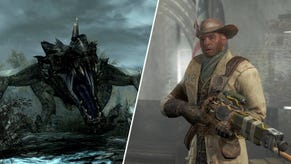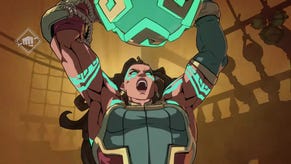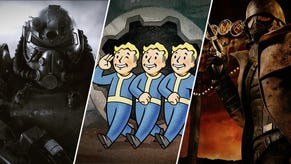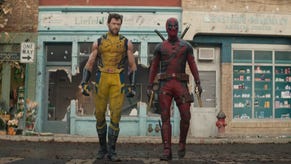Holiday Retrospective: What happened in July 2011
A Persona spin-off baffled our US brethren; San Diego Comic Con went nuclear; Australia prepared to grow up; and EA coughed up a lung to buy one of the best-rated developers in the world.
July should have been a quiet month; we were all looking forward to it. With E3 over and done and a nice summer release drought, Pat lost his head and went on an actual holiday, his first in years. We expected a few weeks of Googling Minecraft videos and Kinect hacks in a desperate search for a headline, any headline.
How wrong we were.
For one thing, we forgot about the San Diego Comic Con, which despite not even having "game" in the title, is becoming more and more important to gaming and geek culture in general. We got an avalanche of new information and media on games which released over the next six months, and those still to come.
Hatched, Matched, Dispatched
But by far the biggest story of the month was one of EA's numerous 2011 acquisitions: PopCap, for a whopping $750 million. Quite a few hats were eaten around the office that day, but PopCap continued with business as usual, we adapted. Zynga reportedly offered $1 billion for the casual games company, and EA had to borrow the $550 million for its own bid.
In other EA news, the publisher picked up Ohai, and Sega took over EA distribution in Japan.
Elsewhere things were a little grim. Disney confirmed the closure of Black Rock Studios and Red Fly, the studio behind the Wii version of the Thor tie-in game, suffered layoffs, which may have been related to a canceled Star Wars title.
Three new teams were born in this despressing climate: Ten of the Eden Games team - the developer behind Test Drive Unlimited 2 - struck out for independence with new studio, Blossom Minds. After Fat Princess developer Titan Games shuttered, a number of its staffers founded Carbon Games. Ex-2K Czech and Bohemia Interactive employees banded together to launch Warhorse.
In other job news, NBA Jam creator Mark Turmell left EA Sports for Zynga, and Dead Rising 2 developer Capcom Vancouver got a make over and began hiring.
Less salubriously, Ubisoft's mobile arm, Gameloft, was accused of illegal working conditions; not much came of this kerfuffle in the end, which is slightly worrying.
Disgruntled Team Bondi staff stopped sending hints and lifted the lid on alleged "sweatshop" conditions among other scandalous treatment. The realities of the industry unfortunately suggest it's probably true. One Team Bondi employee responded by politely describing the complaints as s**t-stirring. Michael Pachter added his two cents, arguing that developers complaining about crunch time should take a shot of cement and harden up in lieu of the benefits of working in a creative industry. Later, he publicly backtracked - a little.
Releases
Namco Bandai's budget sequel Earth Defence Force: Insect Armageddon released to reasonable reviews and at such a low price that it won quite a few hearts.
Nathan had a chat with the indies at Supergiant, coming away from his demo madly in love with Bastion. The Warner Bros.-published dungeon crawler hit Xbox Live on July 20, and turned up on PC, as well, to general critical acclaim - especially its narration system. Had a lovely launch trailer, too.
Call of Juarez: The Cartel arrived with very poor reviews, but in month otherwise dominated by arguably experimental releases, it charted strongly.
Catherine, which had attracted an unusual amount of Western media attention throughout its development, finally arrived in English - although we're still waiting for it in other territories, Deep Silver confirmed it'd be bringing Atlus's horror puzzler to Europe.
Ignition's labour of love, El Shaddai: Ascension of the Metatron, was barely a blip in its US release month despite its massive Japanese launch. The first new game in years from Another World designer Eric Chahi, From Dust, went similarly under the radar with mixed reviews during its Xbox Live exclusivity period - the game's delayed PC version would later be the centre of a PR s**t storm. Ubisoft delighted the PC contingent by announcing the game wouldn't feature its hated always-on DRM. We'd have to wait to see the end of this story, but here's a spoiler: It was a lie.
Firaxis' first foray into social gaming, Civilization World, arrived on Facebook this month, where it has performed consistently if not stunningly, failing really to pull the hardcore strategist or the casual crowd.
This relatively small batch of releases probably partially accounts for the NPD's depressing report on the month as a whole, which saw retail sales fall 26% year-on-year to $707 million. The NPD admitted July 2011 was the US industry's worst month since October 2009 - although only in the retail channel, as the company was yet to implement digital sales tracking. NCAA 2012 was the month's best seller, with tie-in Cars 2 in second place and November 2010 releaswe Call of Duty: Black Ops in third. It wasn't pretty.
On the hardware side, July marked a 29% decrease over 2010's figures, and even the Xbox 360, while still leading the pack, saw its first sales slump since 2009. The gloomy feeling wasn't dispelled during financials season, either: Nintendo's financials revealed global 3DS sales had only just topped 700,000, and the company moved to counter this underwhelming and error-dogged launch by announcing a significant price cut. Early adopters were infuriated - as were shareholders, resulting in president Satoru Iwata taking a pay cut - but Ninty promised a number of rewards through its 3DS Ambassador scheme. On the bright side, the system scored its first million seller with Ocarina of Time.
Sony's report also noted a hardware slump, but saw software sales on the rise, and THQ sadly copped to a $38.4 million loss, canning the Red Faction franchise in the process.
Announces
But it wasn't all doom and gloom, as July also brought optimism for the future in the form of several new announces. One of the most intriguing titles to debut this month was Arkane's Dishonored, the Bethesda-published bane of non-US spellchecks everywhere. The first-person title was revealed as a free-form action adventure game, with an almost sandbox approach.
Square Enix, apparently deciding its famous series of JRPGs isn't mad enough, announced the rhythm action game Theatrhythm, a thing we're still learning to spell.
Burnout Crash, a top-down, casual-friendly downloadable spin-off, was shown off alongside a new piece of Dragon Age II DLC at EA's digital showcase.
New Polish studio Flying Wild Hog announced its debut title Hard Reset, giving the two finger salute to soft modern gaming conventions, consoles, and long PR cycles.
Planetside 2, originally planned as a free-to-play update to the original MMO, was announced as a full release, and Team 17 belatedly admitted that Worms: Ultimate Mayhem is a thing.
Ball's in your court
Legal eagles had a comparatively quiet July, but Firefall developer Red 5 brought a case against publisher Webzen for breach of contract, a dispute which took months to resolve.
Fans got on board the ongoing Battlefield 3 versus Modern Warfare 3 catfight by using ModernWarfare3.com as a redirect to Battlefield 3's site. Activision took it straight to court.
Serials
Several dramas continued unfurling throughout July. See the June instalment - and beyond - for earlier episodes.
In the wake of the Sony hacking saga, the Welcome Back package was extended for US users after a vocal minority forgot to take advantage of it. The PlayStation Store finally came back online in Japan after a downtime of over two months, and EEDAR gave its opinion that the Welcome Back package actually triggered an increase in PS3 sales; Media Molecule noted an extra 1.5 million players in LittleBigPlanet.
CCP met with a delegation of players to seek a resolution to the Incarna-centred scandal costing the company millions of dollars. Nevertheless, the developer insisted it would continue development on the unpopular expansion. It even went so far as to announce more amazingly prices vanity items.
Perhaps caught off-guard by the strong negative reaction, Capcom said it might not reuse the save system featured in Resident Evil: The Mercenaries 3D. Nevertheless, apparently due to hardware limitations, it did.
Still reeling from the Wii U's announce, the industry was gratified to hear Nintendo plans to be more flexible with the system's online features.
EA reiterated its ongoing commitment to Valve's Steam, although the two companies were yet to find a solution, and Dragon Age 2 joined the ranks of missing games. EA announced that it might open Origin to other publishers. We argued that the growing PR disaster was largely fuelled by the companies' unfortunate silence.
Australia's attorney-generals prepared to meet and vote on the introduction of an R18+ ratings category for video games, getting us quite excited about the chances of that finally happening. An election in NSW threatened the movement, despite increasing support, but a decision was made to go ahead with a national R18+ ratings category. Not in South Australia, of course, where the government launched a plan just to re-label MA15+ games as R18+ regardless.
Smedley explained the closure of Star Wars Galaxies with the expiration of SoE's contract
In the first shot of what would become something of a back-and-forth sniping match between the two companies over third part relations, Dennis Durkin said Microsoft has better exclusives.
The hacking epidemic was still generating pockets of ill will, this time with an attack on old Quakecon forums. The forums weren't active, but enough people reutilise the same password and user name combinations for everything to make it a worrying affair.
Final Fantasy developer Tetsuya Nomura confirmed our fears by admitting that Versus XIII wasn't progressing quite as well as expected. Like, at all. On that note, the fan-driven development of Mega Man Legends 3 fell through thanks to purported lack of interest, eliciting crushing disappointment and an apology from ex-Capcom series creator, Keiji Inafune.
Call of Duty Elite's beta went live. It's strange to think we were all still trying to figure out exactly what it is.
On the Operation Rainfall front, The Last Story was trademarked in the US, although this slight beacon of hope was soon dimmed by Nintendo's ongoing refusal to commit.
Much to fans' relief, the NFL lockout came to an end, ensuring madden NFL 12 could release with an up-to-date roster.
Headlines
Xbox folded Games for Windows Live into Xbox.com, continuing a slow process to push LIVE as a platform rather than a console-specific service - much to the horror of anti-GFWL PC fans. The company's financials release showed strong performance in the gaming division, with 30% growth in its fourth quarter and 48% over the year.
Speaking of Microsoft, an incomplete build of Gears of War 3 escaped into the wild, at least two months ahead of release, thoroughly disappointing Epic who were still beavering away at it.
Ahead of August's biggest gaming event, Valve began gently unveiling DOTA 2's gamescom presence; we all saw the signs and still weren't prepared for the storm. MOBA's weight in the industry is well illustrated by the defection of Mass Effect 2's lead gameplay designer to League of Legends developer Riot Games.
Whispers had Sony down for a PSN revamp, a persistent rumour which still turns up about once a month despite failing to actually materialise. It did open the doors to Online Pass systems, though, and drop a cool $20 million in its indie publishing fund.
Crytek and Valve both released new SDKs, with the CryEngine SDK drawing massive attention in particular.
Microtransaction support was added to DC Universe Online as part of its conversion to free-to-play, just months after launch. Speaking of, Ubisoft made two acquisitions to expand its freemium portfolio.
Metacritic co-founder Marc Doyle gave voice to something the industry's been complaining about for years - that the site's handling of game review scores is a little askew. The site also stamped down on "corrupt" practices, axing at least one review outlet from its repertoire.
EA closed down 17 multiplayer servers including Need for Speed and Battlefield titles, much to the dismay of diehard fans. This move would prove something of an industry trend later in the year. GameRanger resurrected a couple, and revealed the games were still drawing significant attention.
Apple made some small adjustments to its international pricing schemes in line with shifting world currency valuations, reducing but not eliminating some glaring discrepancies. Meanwhile, EA sneeringly described the App Store as being in "freefall", a sentiment echoed throughout the year as developers and publishers worried about the sustainability of the mobile model.
And on the homefront, VG247 launched its Team Fortress 2 server, where Pat was repeatedly slaughtered until he gave up in disgust. In a grudge match against Eurogamer readers, we ... won? Lost? Nobody really knows.
Continuing our love affair with the cloud, we caught up with Gaikai's Robert Stevenson, and tracked down BioWare to talk about its FemShep marketing for Mass Effect 3. It didn't work out so well.
Stace waxed nostalgic with Just Add Water as the developed prepped a number of Oddworld HD re-releases. He also went hands-on with Inversion, Namco Bandai's oft-delayed, gravity-manipulating shooter, and got a good look at Darksiders 2.
Come back tomorrow as we continue our exhaustive regurgitation of the year, to save you the effort if remembering with your actual brain. We're all about the service.













